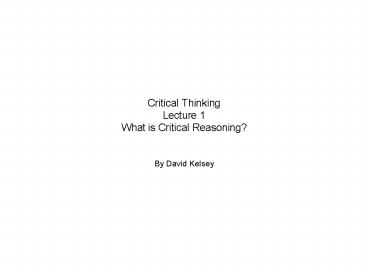Critical Thinking Lecture 1 What is Critical Reasoning? PowerPoint PPT Presentation
1 / 26
Title: Critical Thinking Lecture 1 What is Critical Reasoning?
1
Critical ThinkingLecture 1What is Critical
Reasoning?
- By David Kelsey
2
Course Objectives
- Thinking Rationally We will learn how to think
correctly or rationally or logically. - For someone to think rationally just means that
she, from her set of beliefs, makes inferences
that are justified given the laws of logic.
3
The Laws of Logic
- The laws of logic dictate just which inferences
we can make. - They are rules for making good inferences.
- 2 examples
- Modus Ponens
- Modus Tollens
- Sentence letters
4
Inferences
- An inference a statement that follows from one
or more other statements.
5
Statements
- A statement is a proposition.
- A proposition is the meaning of a sentence
- Just like words have meanings, sentences have
meanings.
6
Propositions
- The form of a proposition
- it is the case that.
- Propositions are true or false.
7
Propositions Sentences
- A sentence does two different things it both
expresses a proposition and asserts a
proposition. - The expressed proposition
- the literal meaning of the words of that sentence.
8
Expressing a proposition
- For a sentence to express a proposition
- is for that sentence to toss the proposition up
in the air, so to speak. - It is to put the proposition up for usage.
- Knowing what proposition a sentence expresses
9
The asserted Proposition
- Making use of a proposition
- Just how a sentence makes use of the proposition
a sentence expresses determines its actual or
intended meaning. - The proposition asserted the actual or intended
meaning of a sentence - The actual or intended meaning of a sentence
- What the speaker or writer of the sentence means
when she writes or says it.
10
Miscommunication
- Miscommunication
- When the hearer doesnt take the sentence to
assert what the speaker intends
11
Sarcasm
- Other kinds of sentences
- Sarcasm
- The messy roomate
- She always takes out the trash.
- This sentence expresses
- But the sentence asserts
- Other occassions when meaning splits
12
Arguments
- Arguments when one proposition is inferred from
one or more other propositions - Other definitions of an Argument
13
Arguments
- Argument a position supported by reasons for its
truth. - To take a position
- An issue what is raised when one considers
whether or not a proposition is true.
14
Issues
- Issues
- we might go as far as to say that an issue just
is a question. - Intelligent life
- Safety belt law
- Mac vs. Pc
15
Arguments Positions
- Arguments Positions so when we take a position
on an issue and support it with reasons we have
given an argument. - Intelligent life
- Safety Belt law
- Mac vs. Pc
16
Conclusions Premises
- Arguments
- The conclusion of an argument
- The premises of an argument
- Examples
- Socrates again
- April showers
17
What an argument isnt
- What an argument isnt Let us be a bit clearer
about what an argument is by stating what it
isnt. - Not a Fight
- Not Persuasion
18
Persuasion
- Persuasion vs. Argument
- An argument offers support for some claim, its
conclusion. - Persuasion neednt offer any support for a point.
- Not Logic It merely attempts to get you to
believe a point. - Persuasion through rhetoric
- Rhetoric is a broad category of linguistic
techniques people use when their primary
objective is to influence beliefs and attitudes
and behavior
19
Arguments vs.Explanations
- Arguments vs. Explanations
- Explanation of X If one gives an explanation
about some thing X, one gives some details about
X with the hope of coming to better understand X. - Example fixing a flat tire
20
Recognizing Arguments
- Conclusion Indicators find the conclusion of an
argument by looking for conclusion indicators. - Examples of Conclusion Indicators therefore,
hence, and others - Premise Indicators find the premises of an
argument by looking for premise indicators - Examples of Premise Indicators because, since,
and others
21
An introduction to formalizing an argument
- Challenging an argument
- In challenging an argument you must first
formalize it. - Formalizing an argument
- Is the reconstruction of that argument in its
most simplified form.
22
Explicit Premises
- Explicit premises
- asserted by the words of the text.
23
Implicit Premises
- Implicit or unstated premises entailed by the
words of the text. - Bloodhound example
24
Factual claims
- Arguments and Claims
- Factual Claims
- Either true or false.
- Established methods
- Generally Established Criteria
- Settling Disagreement
- Example Water is H2O
25
Non-factual claims
- Non-factual claims
- No established methods
- Cant settle Disagreement
- Some examples
26
Value Claims
- Value claims non-factual claims that assert that
some moral property is instantiated in some
object or action or event. - Properties and Moral Properties
- Never Ought from Is

